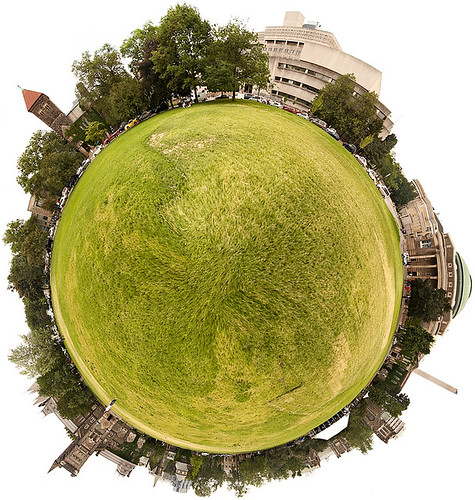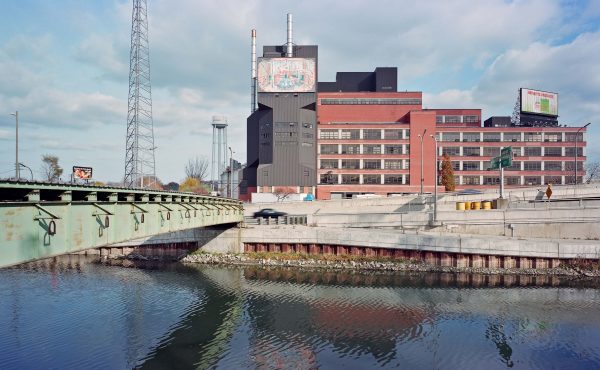
Spacing is a big fan of Toronto’s Poet Laureate, Pier Giorgio DiCicco. He is a Roman Catholic priest who writes wonderful poetry and has written an engaging book called Municipal Mind: Manifestos For The Creative City (Mansfield Press, 2007). DiCicco has written for us previously and often attends our events.
Spacing’s editors heard The Poet (as we call him) make a blistering speech at the Walk21 conference in October. Parts of his talk related perfectly to the tone we were looking for in our Green Issue we just released. The Poet let us publish an edited version of his speech as the opening spread of the new issue. We thought we’d share it with you today.
– – – – – – – – – – – – – – – – – – – – – – – – – – – – – – – – – –
After the many seductions, logical and visionary, have been played—I shall make a plea for the salvific aspect of the act of walking. Yes, salvific. Not just to save the environment, but to save ourselves, and not just by regarding the environment. We will not save the environment until we have found a reason for living together. Until we discover civic care in each other, until we restore the city to its definition as a place of unexpected intimacies, not just as a place of amenities, convenience, business, and entertainment, we will not have sustainability. For sustainability is about replacing an ethic of entitlement with an ethic of sufficiency. And sufficiency is what we find in each other. In an era that glorifies independence and even inter-dependence we are shy of admitting the awful truth: that is, we are dependent on each other, not by connectedness, but because we are one body breathing the same air. It is not cars that are the enemy of the pedestrian. The enemy is the absence of civic communion, the lack of empathic citizenship, our inability to see cohabitation as that place where we enjoy ourselves, by enjoying others. All human traffic is under siege, because it is becoming increasingly purposed, guarded, and negotiated. The body is not just a means of locomotion. It is our chief means of restoring a city to its raison d’àªtre, its purpose. And that purpose is civil encounter.
But civic trust has been corroded. Our cities are becoming disinhabited, even when the streets are safe and landscaped; gentrified neighbourhoods are no more interactive than the brownfields and cloverleafs they replaced. The problem is not, fundamentally, to get people to slow down, or to move without being toxic to their environment. The problem is to make people aware that anonymity is as toxic to the ecology of heart as hydrocarbons are toxic to the atmosphere. The problem is how to restore intimacy, curiosity, trust, and play into the happenstance encounter of citizens, in an era when the happenstance and the unpredictable are a threat.
When all the cars will have been taxed or tolled on their way to the cities, when bike paths and parks will have reconfigured our neighbourhoods, when safe and cleaner transportation has cut emissions, a fundamental question will remain. Is the safe city, the sanitized city, the sustainable city, the same as the livable city? If all we want is clean and well-designed cities, it will likely come to pass. But in the long run, to save the environment means that we will want to save the environment not just for ourselves, but for each other. And to reverence each other means that we will have to discover each other.
photo by Sam Javanrouh



3 comments
I agree with much of what The Poet is saying, especially his emphasis on embodiment as the basis for everything that follows in human life. But in our quest to humanize the sometimes sterile streets, please let’s not throw the baby out with the bathwater: I’m referring to his wholesale critique of anonymity.
For me, the fact that I can wander the city streets anonymously (like a flaneur, like a “tart,” like a “good girl,” like anything I want) is part of the great charm of living in a city. I don’t want to be accosted — whether it’s by canvassers or panhandlers or muggers (to name a veritable panoply of the kinds of people who can “get in your face” on the street). I don’t want to to be in intimate contact with people when I go out, unless I choose to be. (Incidentally, the people who violate urban anonymity are also often making assumptions about what kind of person you are, whether you’re on the make or are rich, etc., and so they disregard the role of masquerade in city life. But cities are stages — it’s where we get to play.)
If I wanted close intimacies with others on the street, I could live in a village where everyone knows everyone, and everyone knows everything about everyone. And we all know how nasty that can be.
Cities offer anonymity as a balm; I think that to disparage anonymity betrays some dislike of the nature of cities.
It would be interesting to think about the need for anonymity *and* the need for intimacy some more, but not at the expense of one another.
So, this anonymity/intimacy issue has really given me something to puzzle over, because I do understand that DiCicco is basically right — but that my desire for anonymity in the city is equally valid, too. Today I was rereading Anya Kamenetz’s “The Laws of Urban Energy” in Psychology Today (July/Aug.07), which looks at the “flatworlders” (Thomas Friedman: under globalization, location or place doesn’t matter anymore) and “creative city” types (eg., Richard Florida: argues that cities are “spikey” energy places). The argument is between technology and place/locality, in a sense, but Kamenetz’s following paragraph struck me as capturing a solution to the anonymity/intimacy question:
QUOTE
“You may not think of the impatient queue breathing down your neck at the deli as a potential source of cognitive benefits. Yet Judith Olson, a psychologist at the University of Michigan, believes that existing and even future technologies will never replace the advantages of face-to-face interaction. This comparison is the main research focus of her field, called human-computer interaction. ‘There are a lot of things that “come for free” when you are co-located,’ she says, such as body language, gestures, and the nonverbal cues that tell you when to interrupt and when not to.
“People learn, understand each other, and trust each other more when they deal in person. The most important effect of being around others at work, Olson says, is simply knowing that others are working too. The scent of stress in the air is crucial for keeping you motivated.” url: http://www.psychologytoday.com/articles/index.php?term=pto-20070622-000003&print=1
UNQUOTE
To me that means, Yes, it’s good to have that body warmth, that contact, but we need to be able to set boundaries, too (“…body language, gestures, and the nonverbal cues that tell you when to interrupt and when not to”). If someone is in their “anonymous” mode, we have to respect that and leave them alone. If we venture into communal areas that invite sharing — like urban farmers markets or dog parks — then something changes and we want that contact. Festivals work that way, too, of course — and festivals (with their “world upside down” aspect) also enable masquerade, another key fun aspect in city living.
Anyway, excuse my lengthy intrusion on your comments board, but this has really given me something to think about!
There may be an implicit politics in what The Poet is saying. And if he is implying a mode of higher social cohesion and respect versus one of individualism and competition, then we are in accord. If you’re looking for a mode, I recommend everyone read the Situationist International, _the_ French avant-garde urban anarchist group of the 1960s. A good place to start:
http://library.nothingness.org/articles/SI/en/pub_contents/4
Oh, and listen to more Sigur Ros.